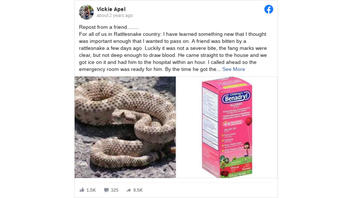
Is Benadryl a helpful first-aid treatment for venomous snakebites? No, that's not true: This anecdote about using Benadryl as a part of first-aid care for a person who has been bitten by a venomous snake is not supported by evidence or the current advice for emergency care of snakebites by toxicology experts.
The story seems to have appeared on Facebook on July 1, 2019, and was copied and pasted. One example is this post (archived here) where it was published on July 18, 2019. It opened:
Repost from a friend........For all of us in Rattlesnake country: I have learned something new that I thought was important enough that I wanted to pass on. A friend was bitten by a rattlesnake a few days ago. Luckily it was not a severe bite, the fang marks were clear, but not deep enough to draw blood. He came straight to the house and we got ice on it and had him to the hospital within an hour. I called ahead so the emergency room was ready for him. By the time he got there his arm was starting to swell to the shoulder and his throat was getting tight. The first thing the emergency room did was give him Benadryl. anti-venom must be received within 4 hours of the snakebite, but the immediate threat is swelling and death of tissue, which was treated with the Benadryl.
This is what the post looked like on Facebook at the time of writing:
(Source: Facebook screenshot taken on Mon Mar 15 18:14:15 2021 UTC)
The post continues:
The swelling in his arm and throat started going down right away. The anti-venom medicine had to be prepared and was not ready for a couple of hours. He ended up getting two doses of antivenom and spent the night in the hospital, where they drew blood every three hours, but came home healthy the next day.A nurse, told me to go buy the children's chewable Benadryl for my emergency kit, it won't spill or break.It is given according to body weight, so can be used for adults also, just give a larger dose. She said if you chew it and hold it in your mouth it will absorb just as fast or faster through the membranes of the mouth than from the stomach, which could save a life.I copied and pasted this bc thought it was good info!
Hi Everyone, I wanted to address the poor information about the use of Benadryl (diphenhydramine) making the rounds on...
Posted by Nick Brandehoff on Wednesday, July 3, 2019
Lastly, remember that Benadryl (diphenhydramine) provides no benefit following snakebite. Benadryl is an antihistamine. Histamine is not a major component of snake venom, so antagonizing the effects of histamine accomplishes nothing. It does not "buy time" or "reduce inflammation" or anything of the sort. All it does is give people a false sense of security and distracts them from the most important thing: getting to the hospital so that someone can determine the need for antivenom, which is the definitive treatment for snake envenomation. The only time Benadryl may be helpful is in the rare case of an allergic reaction to either the venom or the antivenom. And in serious reactions, the drug of choice would be epinephrine, not Benadryl, which helps for hives and itching but not the cardiac or respiratory complications.


















